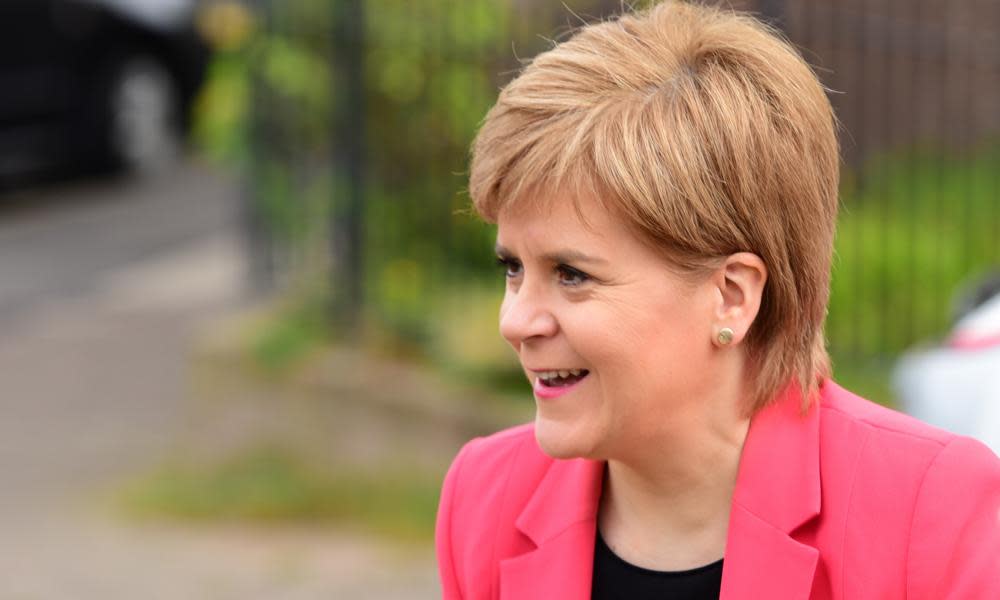English voters admire Nicola Sturgeon – but they fear her too | Deborah Mattinson

During the 2015 general election BritainThinks, in partnership with the Guardian, set up a series of panels around the country. We tracked the reputations of all of the leaders as the campaign unfolded. Nicola Sturgeon, little known by many at the start, emerged as the leader with the most enviable reputation. This may have been a given in Scotland, where we had a panel in Glasgow, but in the rest of the UK participants in Dewsbury, Ealing, Thanet and Taunton Deane were wowed by her character and leadership qualities.
Voters look for a mixture of strength and charisma in a leader. She had both, in spades. One voter told us: “I thought she was going to be Salmond’s puppet, but she’s turned out to be really strong and tough. It’s hard not to admire her, but I like her too.” I had to break the news to someone in a Thanet focus group that she would not be able to vote for Sturgeon, as she didn’t live in Scotland.
So why, then, did we see the polls consistently identifying a possible coalition between Labour and the SNP as one of the least favourable outcomes of the election? A YouGov poll published two weeks before polling day found that this combination was thought by most to be bad rather than good for Britain (60% versus 24%). It scored a dismal net minus 37% in overall favourability, while a Labour-Liberal Democrat combo scored minus 22%, and Tory-Lib Dem minus 14%.
The idea of a Labour-SNP coalition was particularly disliked by Ukip-leaning voters (minus 78%), and by Tory-leaning voters (minus 89%). Worse than that, as we moved in to the final days of the campaign an ORB poll showed that the prospect of a post-election deal between Labour and the SNP made one in four voters – potentially crucial in a close contest – less likely to support Labour.
Paradoxically, the reason for this negativity lies in the enthusiasm that the lady in Thanet had for Sturgeon – and her subsequent disappointment when she discovered that voting for Sturgeon was simply not an option. Sturgeon might be a great leader, but, to an English voter, she is not “our” leader. And the more English voters digested that fact, the less comfortable they felt. Asked the classic focus group “projective technique” – if this leader were an animal, which would they be – voters north of the border described a mighty lion. Voters in England stuck with the feline theme but were more likely to characterise the SNP leader as a domestic cat. As one explained, “She’s smart, but maybe a bit sly.”
This matters, because leadership matters – more, much more, than anything else in a general election. Throughout the 2015 campaign, our panels kept online diaries, commenting on anything and everything that struck them about the campaign. This was open-ended – they could write about whatever they wanted to. Adding up all the comments, we discovered that an extraordinary seven out of 10 comments posted focused on the characters of the leaders. For these swing voters the contest was judged almost entirely by the perceived quality of each party’s leader.
This was particularly unfortunate for Labour, whose own leader, Ed Miliband, had the poorest ratings of all. Focus groups described him as “awkward” and “ineffectual”, although “nice” and definitely “trying hard”. In contrast with Sturgeon’s lion, Miliband was a “panda”. One participant explained why: “He’s just like a baby panda, cute and likable, but clumsy and slow.”
The stronger Sturgeon seemed, the weaker she made Miliband look. In a coalition, voters felt they could see who would dominate, and feared what Sturgeon might force Miliband to do. This was especially damaging on public spending: expectations that the SNP would “spend spend spend”, sabotaging Labour’s attempts to be fiscally responsible.
So it isn’t difficult to see why the Tories are choosing to raise this spectre again. Astonishingly, Jeremy Corbyn’s personal ratings are, as we enter the campaign, even worse that Ed Miliband’s were in 2015. He is seen as “weak”, “bumbling” and “out of touch”. This matters even more against the backdrop of Brexit turmoil. Most voters conclude that strong leadership is needed more than ever.
Focus groups conducted this week, after Theresa May’s shock announcement, confirmed as much, one voter commented: “If it’s 27 against one, we need our strongest people at the table.” Another said: “I’ll be voting for strength, direction and whoever will represent the UK in the best light possible.” To those swing voters, May looks a lot like that leader, and all the more so in contrast to Corbyn – or, worse still, a Corbyn and Sturgeon coalition.

 Yahoo News
Yahoo News 
